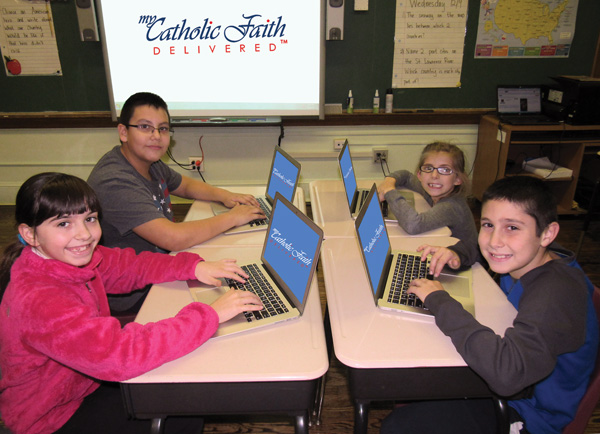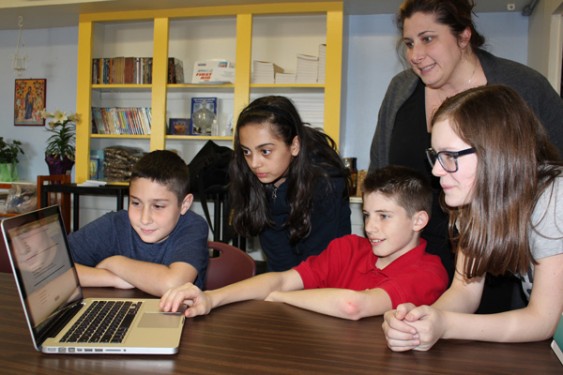
With schools utilizing SMART Boards and iPads in everyday lessons, staying current with the trends and tools that facilitate learning is key if the Catholic Church wants to connect with and spread the faith to younger generations.
In an effort to meet today’s youth where they are, St. Francis de Sales parish, Belle Harbor, has become the first in the diocese to offer online religious education classes for elementary-age students, in addition to traditional catechetical classes.
“We live in a social media and technology-friendly era, and a lot of kids and adults – whether it’s good or bad – live their lives online,” said Robert Ruggiero, faith formation director at St. Francis de Sales. “This experience is an interactive online program that really challenges students to think.”
The parish is partnering with My Catholic Faith Delivered (MCFD), which offers online classes about the Catholic faith for people of all ages. The company has over 45,000 users in 160 countries, and works with more than 225 parishes in 40 dioceses.
Since 2014, the Brooklyn Diocese’s School of Evangelization has worked with the company to offer adult faith formation courses for over 5,000 diocesan educators.
Ruggiero introduced the online option last fall with the blessing of Msgr. John Bracken, parish administrator, and the support of Theodore Musco, director of the diocesan Office of Faith Formation. Musco also sits on MCFD’s advisory board.
St. Francis de Sales currently has 88 children studying online, while 280 students attend weekly classes on-site. To keep pace with peers, online students must complete 28 lessons, but may do so on their own schedule. All they need is access to the Internet to log into mycatholicfaithdelivered.com.
Work at Own Pace
“I like that you can go at your own pace, whenever you want – morning, daytime or night,” said seventh grader Peter Memoli.
The online option made sense for Peter and his family. He starts school at 7 a.m. with accelerated courses, which continue afterschool until 5:30 p.m. Religious education classes at St. Francis meet at 6 p.m. on Wednesdays, which meant he’d be waiting until almost 8 p.m. to eat dinner.
“That’s a long day for a 12-year old,” said Kristine, his mom.
A longtime catechist, Kristine admits she had reservations about the program, but was willing to give it a try if it meant a less hectic routine for her family of five.
Twenty minutes into Peter’s first lesson, her doubts were gone.
“I love this program,” she said. “It opens up a dialogue. Peter and I do it together because I want to learn, and there is so much he’s learning that I wasn’t taught. I feel like I’m learning it too.”
Both Kristine and her husband, a convert to Catholicism, sit with their three children when they do the lessons, usually on a weeknight or on the weekends, whenever time and schedules permit.
Parental involvement is a major benefit of the program. “It goes back to where catechesis really begins – in the home with the parents. Not only are the children learning, but the parents are learning,” Ruggiero said.
Students are using MCFD’s Faith and Life series, which is adapted from Ignatius Press and is in conformity with Brooklyn diocesan standards and the Catechism of the Catholic Church.
Lessons focus on the liturgy, sacraments, morality, saints, social teaching and the Church’s life and mission through an interactive, audiovisual experience that includes prayer, Scripture, music, videos, art, games, reflections and regular assessments.
“This gives you a lot of information,” seventh-grader Siobhan Kalfur said, comparing the online and in-class religious instruction she’s received. “The tests are longer, more complex and the questions are definitely more difficult. This really makes you think and use your head.”

Students not only benefit from the “substantial content founded in orthodoxy and tradition,” Ruggiero noted, but the online option also helps address challenges facing on-site catechetical programs, including fewer volunteers, larger classes, the need for varied learning styles and occasional behavior issues.
Just as a catechist would do, MCFD records students’ progress with the lessons, how much time they spend on them and test scores, with all data being forwarded to Ruggiero. Kristine Memoli serves as the online program’s catechist coordinator and is a resource for both students and families.
“There is maximum monitoring of each individual student,” Ruggiero said. “But we’re not going to come after you. You either do it or you don’t. If you don’t, we’ll see you in the same grade next year.”
Monica Kalfur, Siobhan’s mother and an educator in the public school system, says she’d recommend the program to parents who have a structured routine at home and whose children work well independently.
“I knew being able to do things at her own pace was going to work so much better for her (Siobhan),” Monica said.
Asked whether she missed the classroom setting and meeting with peers each week, Siobhan admitted that she does, “a little, but not a whole lot.”
On-site Enrichment Sessions
She gets to experience the social and spiritual aspects of her faith at weekly Mass, and once a month when online students get together for an enrichment session, a type of “mini retreat,” Ruggiero said, that focuses on the spiritual and pastoral aspects of their faith formation. Students learn about the liturgy, receive sacramental preparation, have opportunities for confession and participate in devotional practices.
Regardless of whether students attend classes on-site or online, Ruggiero said, “They must be at Mass each and every week. That’s the core of our faith and faith formation.”
While the online program has its benefits, it is not for every child, especially those who learn best in groups, and Musco cautions that remote learning “shouldn’t replace individual interaction with a classroom teacher.”
However, he added, “I always try to encourage people to use whatever resources are available.”
That is why Ruggiero hopes other faith formation directors might look into online catechesis programs for their students.
“It’s new and it involves technology so there’s a fear of the unknown,” he said. “But for students growing up in a generation of technology and social media, I firmly believe this is going to be the future of education, whether we like it or not.”
